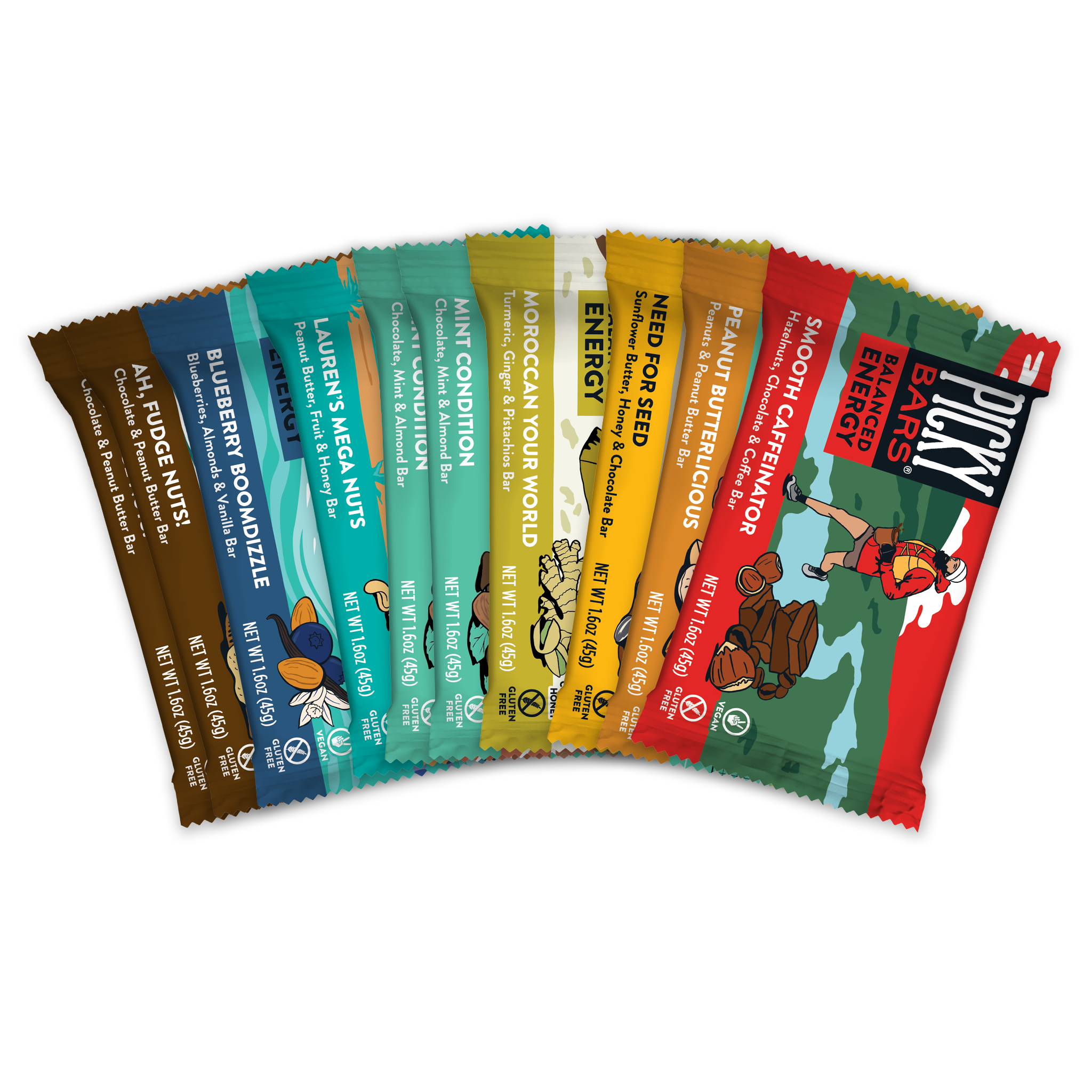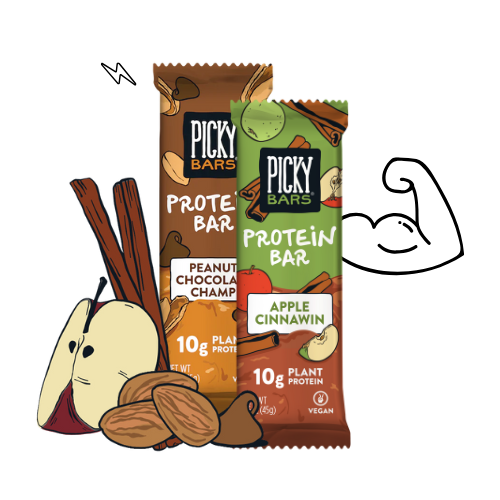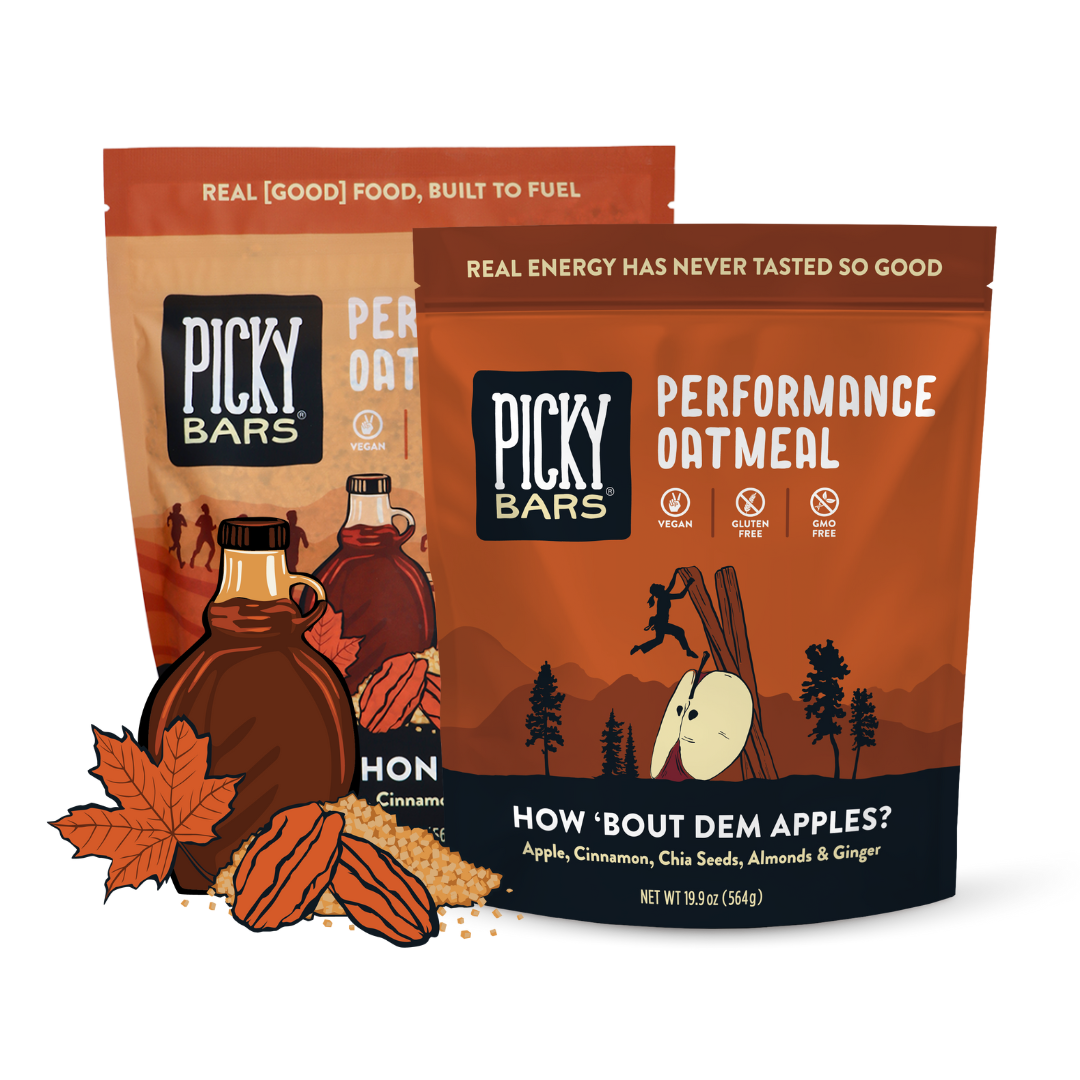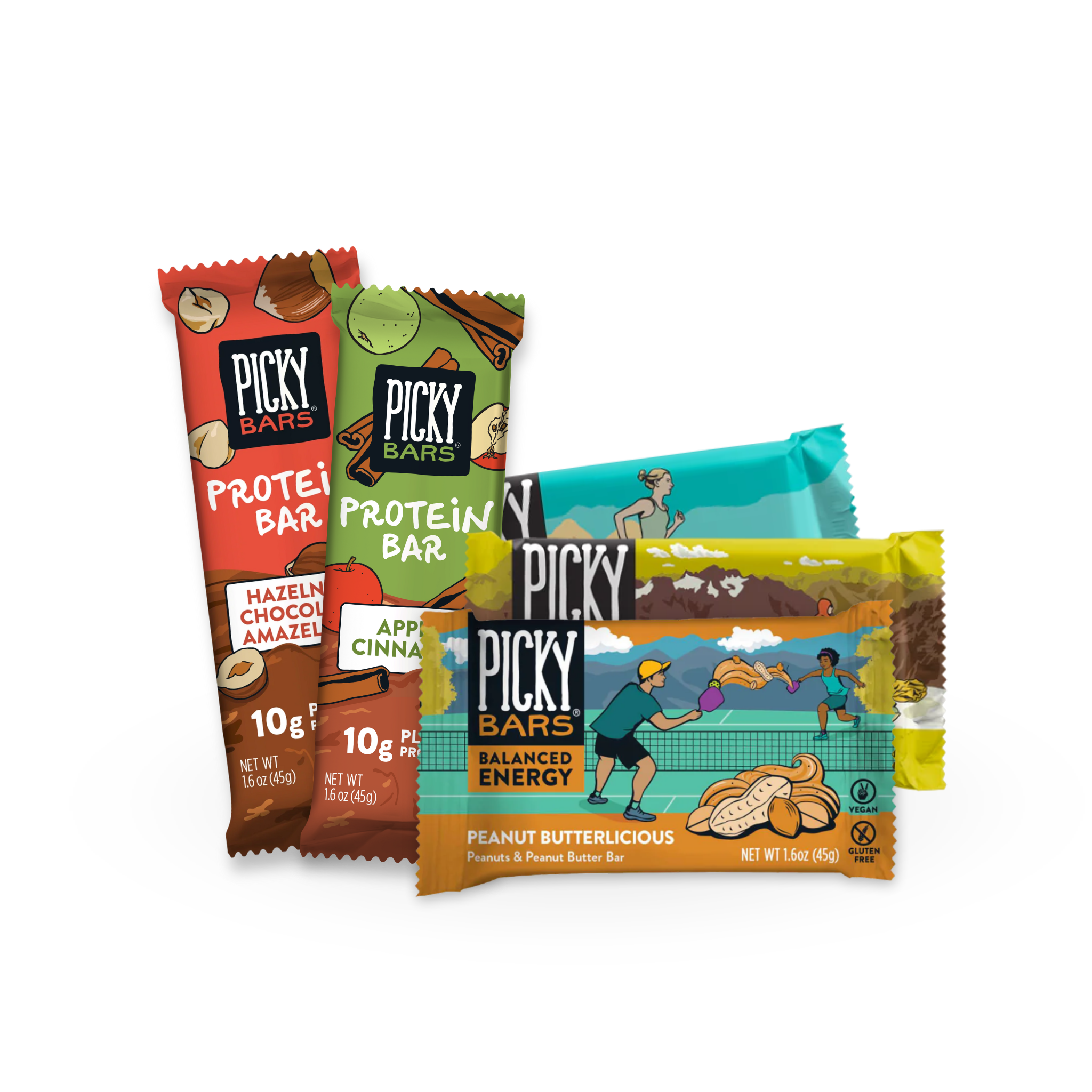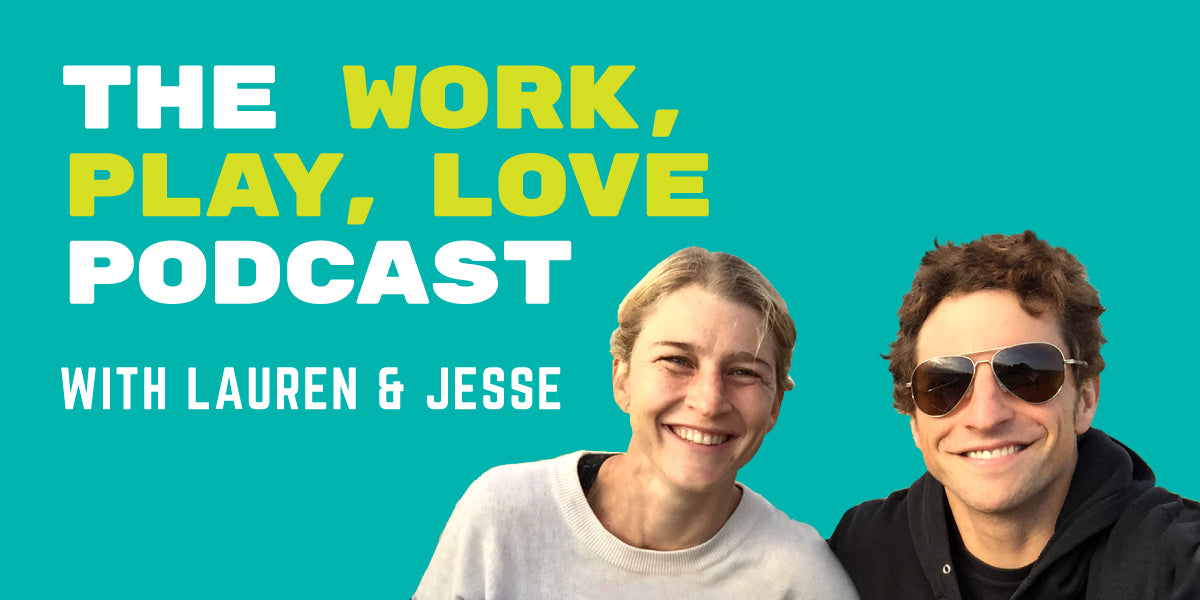

· By Sarah Conklin
40: Summer Training, Beginner Cycling, Equity
Juggling work-life balance can be a real three-ring circus, which Lauren & Jesse know first hand. Led by listener questions, this new podcast is all about sports, biz, and family. [ASK YOUR QUESTION]
40: Heat Training, Cycling Intro, Eating When Training vs. Not, Founders’ Equity In Startups
iTunes | Spotify | Google Play | Stitcher
Description:
Lauren and Jesse are back on the road, traveling back to Bend from San Francisco where Jesse has just had foot surgery. Their road trip entails listening to new podcasts, discussing Jesse’s recovery outlook, and answering a bunch of WPL listener questions. They answer a question from a listener in North Carolina about training in the hot summer months, they discuss nutrition and relationship to food when you’re training vs. when you’re in an off season, they offer some bike-buying advice to someone new to triathlon, and they share the business side of Picky when they were first getting started to answer a listener question about founders’ equity. So get ready—it’s 7 hours to Bend, and you’re in the passenger seat for this week’s WPL adventure.
What's Goin' Onnnn
L: I’m totally digging Going Through It by journalist Ann Friedman. I really respect her work and this new podcast is totally interesting. Outside of the car trip, though, the Little Wing athletes are back from altitude camp. We’re going to Tenacious Ten, which I’m pumped about. And I chatted about my book with an author I admire!
J: I had foot surgery 24 hours ago and I feel pretty good about how everything went. I’m sure I’ll get bummed out in a few weeks, but all in all I feel OK about where I am and what I’m focusing on. I have every intention of coming back and racing at a high level again, but now I have a lot of time to spend with family and with Picky Bars.
Speaking of Picky Bars, we’re at the tail end of our 20% off Spring Cleaning sale. Head over to www.pickybars.com and save when you grab some bars, granola, oatmeal, and even your first month of a Picky Club membership.
Warm-up laps
10:41 - In honor of the new line of Picky granolas, what is the most "granola" thing that each of you do? Hopefully you get what I mean by this... a synonym would be "crunchy". You guys seem to be very environmentally and socially conscious, which is awesome, so I'd love to hear some intentional habits/practices you have that benefit mama natche.
J: I’m always trying to maximize the fuel-efficiency in my vehicle. And I try to reduce my driving time! So I bike a lot.
L: I try to minimize my plastic usage—which is really hard! Especially when you have kids!
14:16 – Hi Lauren! I look forward to the podcast each week. I have a tasty bite: Would you please fill us in on whatever happened with your cramp? I saw that you ran a half marathon recently. Does it still come and go? Did you find a solution? I've run the gamut of professionals and quasi-professionals trying to help me with the same issue. Would love to hear!
L: I did feel my cramp towards the beginning of the half. But what I’ve learned is that the cramp is related to fitness. The more fit I am, the better I can handle the cramp. In this instance, I recognized it right away and chose not to increase my speed, which would have made it a lot worse. That’s one of the things I love about this stage in my career is that I know when to listen to my body and pick a pace that works for me. Earlier in my career, I would’ve run through the pain, which would have caused inflammation and issues for days or weeks after. One other thing I do to alleviate the cramp is to stop and burp a bunch—I’ve met other people who have the same problem, and they do the same thing.
17:56 – When you’re a crazy work-play-love-r who has to sometimes get their run in without a shower, what’s the appropriate protocol for hygiene?!
J: I’m totally cool with the sink shower. I’ve gone straight from a race onto a plane. But in the airport bathroom there’s enough soap and paper towels to make yourself presentable.
L: You really just have to take care of the important areas. Crotch and pits.
J: Yeah. That’s where I stand. I’m cool with that.
L: It also depends on what you’re doing. Like are you going on a date? I mean, if you’ve got decent deodorant and perfume or cologne, I think you can get away with not showering for quite some time!
19:20 – If you are doing a late afternoon/early evening workout, how do you go about re-hydrating afterwards, and not have to wake up and pee when you sleep at night?
L: I would front-load the water—take in as much as you can as soon as you can after the workout. And try to get all the pees out before you go to bed. With kids, when you’re trying to get them to stop wetting the bed, you stop giving them water an hour or so before they go to bed.
J: Make sure too that you’re hydrated as you go into the run.
L: Yeah, starting your day with a good amount of water goes a long way to making sure you’re hydrated.
20:44 – Someone asked me if I get a pedicure before or after a race. I guess some marathoners do this? Pretty sure it's just mental prep for racing, but it made me wonder: how good of care do I need to be giving my feetsies? I mean, I wash them with a scrub brush, but it's a quick process and outside of clipping toenails, those things are getting no attention. Do I need to soak and pamper them? Do you two do that? Does every runner in the world do this except for me?!
L: I think this is just a way to kill time before a race and some people do it. I don’t do it—you don’t want someone buffing off callouses you’ve built up right before you go on a long race! That would be a disaster. Just trim your toenails—take care of your feet like you would normally. Wear good socks, like Stance 360.
J: Yeah, don’t cut your nails too short, either. I’ve made that mistake and it can be painful. I’ve never had a pedicure before, so I stand behind Lauren here. I would also recommend shaving your legs!
The Meat and Potatoes
27:29 - I’m a recreational but dedicated runner, and running’s been going pretty great for the past few months! Trained hard, set some PR’s, etc. I’m really hyped about all things running and excited to see what I can accomplish during the next few seasons... which is why I’m dreading the next 4 months. I live in the south, and training in the North Carolina summer is always a slog. I do not handle heat well and my times on everything from easy runs to races will slow down by 30-45 seconds per mile. I know it’s good for me physiologically—“poor man’s altitude training” and all that—but psychologically it is sooooo discouraging to watch the heat erase all my hard-earned gains from the spring, even if I know I’ll get them right back when it cools down again. Do you have any tips from athletic experience and coaching, including applicable lessons from altitude training, to take into the summer? Any advice about staying sane and motivated day-to-day, knowing that summer race and workout times will not beat or even match spring ones? On the flip side, any suggestions for making the most of the heat: productive workouts or best practices to maximize long-term gains?
J: Your times are going to get slower and your effort is going to go up. And that’s totally normal. It’s good to recognize that this is what happens physiologically, and it happens to every athlete. I struggle in the heat—a lot. When I’m in the heat or doing heat-adapted training, I lower my expectations, and I lower my output by a similar amount – like 25% less output. It’s also important to make sure that you are re-fueling and hydrating properly during your recovery. A cool idea might be to schedule a race in a cooler climate this summer, so you can take advantage of your heat-adapted training!
L: I think that’s a really cool idea to plan a getaway with your running friends for a race in a cooler climate. When my athletes get into altitude training we have our altitude attitudes, we have our altitude expectations, we have our altitude workouts. Things are different at altitude and so we adjust everything to fit in that world. We look back and see how we performed at altitude in the past. I would recommend picking a handicap for yourself. Whatever it is—30 seconds off your normal time—anything like that, use that as your starting point.
Some things to think about. When you’re performing in this environment, you should only compare yourself to past performances in the same environment. You also don’t want to go on long, extended runs in the heat—so dramatically reduce the paces, or break up the pieces in to smaller workouts where you can get the outcomes you desire.
35:33 - I signed up for my first triathlon in June (For fun and a new experience !!) and am looking for any general newbie advice. I am 36, a nurse practitioner, mom of two small boys (3 and 5) and have been running consistently for exercise, local races and fun for 10 years so I’m definitely juggling the working, playing and loving with a packed schedule! I am not nervous about the swim (800 m) or run (5 miles) but the bike portion (17 miles) has me slightly nervous only because I don’t love biking or even have a bike yet!! Any recommendations for which bike I should purchase (knowing that I am NOT out to win!) and basic road rules for cycling that I need to know for a race? Something that I can transition to use as an active mom out for rides with my boys? I know you are used to questions from higher level athletes, but any advice or recommendations would be great as I venture into trying something new! Thanks for doing all you do! Keep up the good work, and good luck with the foot!!
J: I would suggest buying a standard road bike. You get the best value from the biggest brands—Trek, Specialized, and Giant. I would get something with a front derailleur and a rear derailleur—22 gears or whatever comes standard now. I would also use cheap aero bars to clip on to the front of the bike, so you can switch between an aerodynamic position, if you want to, to a comfortable riding position that you might take when riding with your kids.
L: I think that’s awesome advice, and I would recommend just heading into a bike shop. Those people are really excited to help you find a bike that will work for you and your needs. They want you to be a satisfied customer. So I think checking into a bike shop is a good idea.
J: Another great thing about local bike shops is that you can go on community rides with folks and learn about bike etiquette, safety, and have a fun way to get experience on the road.
- More from Jesse on Triathlon for Beginners: Triathlon for Noobs
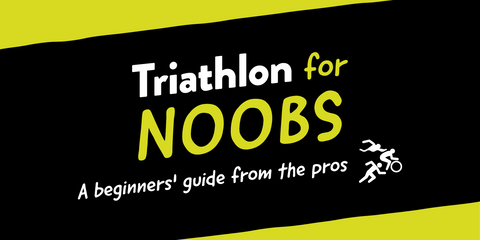
40:05 – Jesse and Lauren, I am wondering how, if at all, your relationship with food and body image, change during an injury or downtime after a race (I am hoping Jesse will have some good insight on this now given the stress fracture - which sounds like it really sucks.) I have struggled with a full-blown eating disorder in the past, and have noticed that I have a better relationship with food when I am training for something big. For example, I feel okay eating a bagel before a 20-mile run or on a week when I run 50+ miles, but not okay eating a bagel if I am going to be sitting around all day or am unable to run at all. How do you navigate fueling/eating when you are not able to exercise as much as normal? Thanks in advance if you answer this question!
L: I noticed, when I was in my 20s, a lot more fluctuations with my weight when I was injured. Now that I’m in my mid-thirties, I notice it less. But my relationship to body image and food have really changed in that time. I think I had a lot of fat-phobia in my 20s, which stemmed from a lot of the cultural messaging we receive. And I think that fat-phobia can creep in when you’re injured and worried about your body changing in any way.
Earlier in life, I did what most people do. Have something to celebrate? Eat something! Lonely? Eat something! Stressed? Eat something. Food is a salve for a lot of things, but it’s not really the right salve. So that’s what’s changed for me. When you lower the stakes and not worry about your body changing as much, and have an easier, less-restrictive approach to food, it can shift your relationship with food to something that’s healthier. I think there should be no foods that you can eat when you are training that you cannot eat when you’re not.
J: I think it’s really important – especially when you’ve had an eating disorder – to speak with someone. I found that this idea of worrying about food – and restricting foods when you’re training vs. not just led to a restrict-and-binge cycle that was really unhealthy. I experienced bulimia in college, and I’ve had to work gradually over a decade to develop a better relationship with food—and I agree with many of the things Lauren said on that front.
50:47 - I've had the fortune of a positive financial exit from a business I started with 4 other people, and as the business evolved the roles of the 5 founders gradually evolved across a wide spectrum of involvement. By the time we sold the company, on one end of the spectrum one founder was CEO and on the other end, one founder was no longer involved with the company at all. I remember the strong feelings that came about once we started correlating an actual monetary value to our hard work and as much as we tried to be fair, I definitely felt like there was room for improvement to match financial outcome with time and money put in and risks taken. As I mull over future entrepreneurial endeavors, this question keeps coming to mind. How do you structure equity in the company in a way that rewards founders proportional to the resources (time and money) they put in? If you don't mind sharing, how have you two and Steph addressed this? For example, I've heard Jesse say you all haven't drawn an income from Picky Bars, even while Jesse is heavily involved in the day to day business of building the company. Does that alter his ownership stake in Picky Bars? I know conversations about fair compensation and ownership can be tricky with business partners because of how personal those relationships can be. How have you all handled those conversations as level of involvement shifts over the years?
J: This is a very important conversation to have up front with your partners where you can all set expectations. Luckily I had some experience working in startups before, where I got to see how equity and pay worked between partners, and how that can be a transparent—or not a transparent piece.
L: The way we started, we gave 30% respectively to Jesse and me, and 40% to Steph. That way Steph owned more than either of us individually, but together, Jesse and I owned the majority of the company.
J: But Steph moved away from Eugene, and over time it was clear that Lauren and I were putting more into the business. So we had many open conversations every 3-6-12 months about what each person was doing, and what that would look like from an equity standpoint. And we started changing those percentages around basically at the end of each tax year to sort of represent how equity share was changing.
My two cents is to be really honest and open when you’re setting things up at the start of your business, and then be open to things changing. The reality is you just don’t know how things are going to change with your business when you’re just starting out. We’re lucky at Picky Bars that all of our partners including some of our early employees trust me to handle these things—and our position is always just to be open and honest about this. But that’s not how every business does it.
Take a listen to for another take on how ZipCar navigated the exit of a partner on Going Through It.
Follow-ups
1:00.53 - Follow up #1
Hi Lauren and Jesse! This is a follow up to a question I asked a few weeks ago! I am the one who was injured leading up to Boston and asked how to re-frame expectations going in injured. Let me just say that your response to my question and the follow-ups you shared on the podcast were the biggest encouragement to me. Any time I got defeated leading up to Boston I thought about your wisdom. Well Boston is done! I can now say I am a Boston finisher and at the end of the day my time meant nothing to me, but the experiences I had on the course meant everything. I was so relaxed all weekend even before the race and I had the most fun I've ever had in a race. I gave high fives, grinned the entire time and had the best time giving thumbs up and acknowledging spectators and volunteers around me. I was living this experience up! I actually ended up running with a friend who I have never ran with and we ran the whole thing together! Every time we passed a tracker on the course we put our arms up and said, "Our family and friends will know we are still alive!" Disclaimer here is that I HURT the entire time, nothing was ever easy, but smiling while in pain actually works. I smiled the most from miles 20 to 26 and I probably looked like an insane person but I was just so happy to be out there running the darn Boston Marathon. Running this way gave me the chance to turn around and run up to my husband when I saw him on the course and then in the finishing stretch I spotted my parents and ran over to them and hugged them! These moments made me feel like my race that day was about a lot more than me, it had so much to do with the people who had supported me up to that point and the whole way through the marathon. I left Boston with a finisher's medal and a heart so full. This experience has made me re-frame how I think about my running overall. It is so much more than my individual results, it's the community that carries us there and the community we have the ability to pour into. Thank you so much for responding to my initial question and giving me encouragement along the way!
1:04:32 – Follow-up 2:
Follow Up to Episode 39 question about supporting competitors: There is a documentary on Netflix called "Touch the Wall" about Missy Franklin and Kara Lynn Joyce that might be helpful for the person who asked how to teach their young daughter about supporting competitors and teammates in competitive swimming. It's been a while since I saw it, but I remember it giving an earnest look at how working together benefited these elite swimmers, as well as some challenges that arose from them being in competition with each other. It came to mind when I heard the question... maybe worth a watch. Thanks, Lauren and Jesse, for the entertaining and educational podcasts, keep up the good work!
1:05:53 – Follow-up 3:
Hello! Quick follow-up on Episode 39 about thinking about swimming as a team sport. I was chatting about this with a friend and she suggested that the CAL women's team (GOOOOOOO BEEEEEAAAAAAAARRRRRRRS) is great at representing this. After the CAL women took second to Stanford for the NCAA title this year, they had some really nice things to say about each other and the team. This whole video is super heart warming but there are some great parts at 1:08 into the video. "It's just selfless swimming on relays to be honest and that's a really overwhelming feeling and it's one of my favorite feelings in the world." Here is another video of some short interviews with all four women on the CAL relay team. "I've only known these girls a few months and I kinda look up to them like my cool aunts in a way"
1:05:59 – Follow-up 4:
Love the pod. Listening to episode 39 and the question regarding the competitive 12 year old swimmer and seeking to foster a supportive versus strictly competitive environment with her peers reminded me of an episode on another podcast that I love - WorkLife with Adam Grant. The episode is called Become Friends with Your Rivals and discusses the benefits and positive outcomes that occur when one works with versus working against a rival. The episode even mentions Shalane and Amy working together in the Olympic trials marathon. Might be a good listen for the young girl! Anyway, I guess my podcast choices have a theme. I wonder what that says about me.
1:07:49 – Follow-up 5:
Follow up to episode 39 on supporting your competitors: I really enjoyed the discussion of supporting your competitors and I like that the question came from a parent who was trying to figure out how to encourage their child to do this. I wish someone had brought this to my mind as a kid as well. I find that currently, as research scientist in their mid-20s, I have to remind myself to "support my competitors" in both work and sports. Research science is a competitive field, but as a woman in the field I feel like it's especially important for me to remind myself that another woman's success is always something to be celebrated and doesn't necessarily diminish any of my own successes. Sometimes this can be hard, but I like the idea of teaching children that you can be competitive and supportive at the same time just to already instill that mindset.
As always, submit your work/play/love question at pickybars.com/workplaylove - Thanks for listening!

[ PAST EPISODES + DESCRIPTIONS ]

